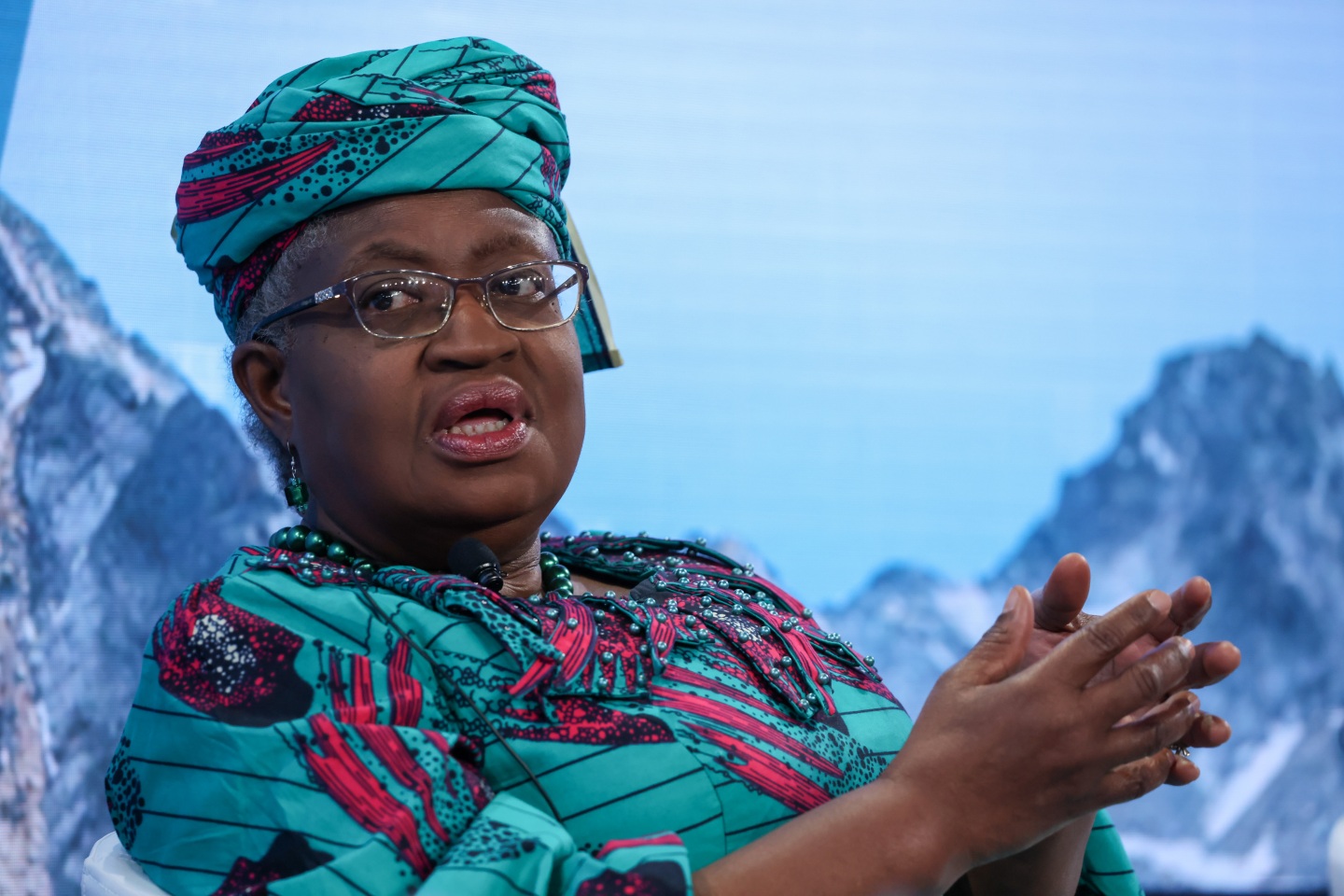
世界贸易组织(World Trade Organization)的总干事在9月27日警告称,一系列同时发生的危机正在减缓全球经济增长,并有可能使全球经济陷入衰退。世界贸易组织由此成为最新一个对世界经济做出悲观预测的全球机构。
今年9月初,世界银行(World Bank)发布一份研究报告,预测最早明年将出现全球经济衰退,理由是经济增长放缓,世界各国央行收紧货币政策以降低通胀。7月,国际货币基金组织(International Monetary Fund)下调了对全球经济增长的预测,该组织的一名官员警告说,世界可能“很快就会在全球经济衰退的边缘徘徊”。
上周,世界贸易组织成为最新一个对避免全球经济陷入衰退的可能性做出悲观预测的政府间贸易机构。
世界贸易组织的总干事恩戈齐·奥孔乔-伊韦阿拉在9月27日接受彭博社(Bloomberg)采访时称:“各项指标看起来并不乐观。”
奥孔乔-伊韦阿拉在日内瓦参加世界贸易组织的年度公共论坛外展活动期间对记者表示,包括食品和能源价格上涨以及俄乌冲突的持续影响在内的多重危机给世界各国带来经济衰退的威胁。
她说:“我认为全球经济陷入衰退——这就是我认为我们正在陷入的困境。”
修正预期
世界银行和国际货币基金组织都已经下调了对今年剩余时间和2023年的全球经济增长预测,俄乌冲突和全球通胀不断上升严重影响了它们最初的经济预测。
4月,世界贸易组织将其对 2022年剩余时间全球贸易额增长的预期从此前的4.7%下调至3%,同时预计2023年贸易额将增长3.4%。但奥孔乔-伊韦阿拉认为,在10月发布下一份全球贸易预测报告时,该组织可能会进一步下调这些预测。
“我们目前正在修正预测,但前景并不乐观。所有指标都指向下行数据。”她在9月27日的另一场采访中对路透社(Reuters)表示,但没有给出确切数字。“前景看起来很黯淡。”
7月,国际货币基金组织将其对2022年剩余时间的全球经济增长预期从此前的3.6%下调至3.2%,同时预计到明年全球经济增长将进一步放缓至2.9%。国际货币基金组织还将在10月发布最新的修正估计。
上周早些时候,总部设在巴黎的经济合作与发展组织(Organization for Economic Co-operation and Development)警告道,一些主要经济体明年可能陷入经济衰退。该组织还下调了其对全球经济增长的预测,预计2022年剩余时间的经济活动将“低迷”,2023年的经济增长将放缓至2.2%,低于该组织今年6月预测的2.8%。
“一场完美的风暴”
奥孔乔-伊韦阿拉在9月27日警告称,俄乌冲突导致的食品和能源价格上涨是世贸组织修正预期的主要原因。
“我非常担心食品安全。”她告诉彭博社。“没有足够的食物让我很担心。”
俄乌冲突导致全球食品价格上涨,并扰乱了供应链。乌克兰和俄罗斯加起来,提供了世界上超过四分之一的小麦,数个非洲发展中国家尤其依赖这两个国家出口的小麦。
但当俄乌冲突在今年2月爆发时,食品价格开始飙升。去年春天,俄罗斯封锁黑海港口,乌克兰粮食无法出口,使联合国的基准世界粮食价格指数(World Food Price Index)创下历史新高。尽管自7月与俄罗斯官员达成允许乌克兰出口粮食的协议以来,世界粮食价格指数已经开始下降,但价格仍然远高于历史正常水平。
自俄乌冲突爆发以来,能源价格也大幅上涨,尤其是天然气,而俄罗斯是世界上最大的天然气供应国之一。全球市场上俄罗斯天然气供应有限,导致全球供应紧张,天然气价格上涨,导致一些国家能源短缺。
奥孔乔-伊韦阿拉告诉彭博社:“目前,如何获取能源是一大问题。”
这不是奥孔乔-伊韦阿拉今年第一次对食品和能源供应链状况表示担忧。在5月参加世界经济论坛(World Economic Forum)时,她将俄乌冲突、中国的新冠疫情封城措施以及疫情余波列为明年全球供应链和贸易增长的重大威胁。
奥孔乔-伊韦阿拉当时在接受美国有线电视新闻网(CNN)采访时说:“就供应链而言,所有这些因素都汇聚在一起,形成了一场真正的完美风暴。”(财富中文网)
译者:中慧言-王芳
世界贸易组织(World Trade Organization)的总干事在9月27日警告称,一系列同时发生的危机正在减缓全球经济增长,并有可能使全球经济陷入衰退。世界贸易组织由此成为最新一个对世界经济做出悲观预测的全球机构。
今年9月初,世界银行(World Bank)发布一份研究报告,预测最早明年将出现全球经济衰退,理由是经济增长放缓,世界各国央行收紧货币政策以降低通胀。7月,国际货币基金组织(International Monetary Fund)下调了对全球经济增长的预测,该组织的一名官员警告说,世界可能“很快就会在全球经济衰退的边缘徘徊”。
上周,世界贸易组织成为最新一个对避免全球经济陷入衰退的可能性做出悲观预测的政府间贸易机构。
世界贸易组织的总干事恩戈齐·奥孔乔-伊韦阿拉在9月27日接受彭博社(Bloomberg)采访时称:“各项指标看起来并不乐观。”
奥孔乔-伊韦阿拉在日内瓦参加世界贸易组织的年度公共论坛外展活动期间对记者表示,包括食品和能源价格上涨以及俄乌冲突的持续影响在内的多重危机给世界各国带来经济衰退的威胁。
她说:“我认为全球经济陷入衰退——这就是我认为我们正在陷入的困境。”
修正预期
世界银行和国际货币基金组织都已经下调了对今年剩余时间和2023年的全球经济增长预测,俄乌冲突和全球通胀不断上升严重影响了它们最初的经济预测。
4月,世界贸易组织将其对 2022年剩余时间全球贸易额增长的预期从此前的4.7%下调至3%,同时预计2023年贸易额将增长3.4%。但奥孔乔-伊韦阿拉认为,在10月发布下一份全球贸易预测报告时,该组织可能会进一步下调这些预测。
“我们目前正在修正预测,但前景并不乐观。所有指标都指向下行数据。”她在9月27日的另一场采访中对路透社(Reuters)表示,但没有给出确切数字。“前景看起来很黯淡。”
7月,国际货币基金组织将其对2022年剩余时间的全球经济增长预期从此前的3.6%下调至3.2%,同时预计到明年全球经济增长将进一步放缓至2.9%。国际货币基金组织还将在10月发布最新的修正估计。
上周早些时候,总部设在巴黎的经济合作与发展组织(Organization for Economic Co-operation and Development)警告道,一些主要经济体明年可能陷入经济衰退。该组织还下调了其对全球经济增长的预测,预计2022年剩余时间的经济活动将“低迷”,2023年的经济增长将放缓至2.2%,低于该组织今年6月预测的2.8%。
“一场完美的风暴”
奥孔乔-伊韦阿拉在9月27日警告称,俄乌冲突导致的食品和能源价格上涨是世贸组织修正预期的主要原因。
“我非常担心食品安全。”她告诉彭博社。“没有足够的食物让我很担心。”
俄乌冲突导致全球食品价格上涨,并扰乱了供应链。乌克兰和俄罗斯加起来,提供了世界上超过四分之一的小麦,数个非洲发展中国家尤其依赖这两个国家出口的小麦。
但当俄乌冲突在今年2月爆发时,食品价格开始飙升。去年春天,俄罗斯封锁黑海港口,乌克兰粮食无法出口,使联合国的基准世界粮食价格指数(World Food Price Index)创下历史新高。尽管自7月与俄罗斯官员达成允许乌克兰出口粮食的协议以来,世界粮食价格指数已经开始下降,但价格仍然远高于历史正常水平。
自俄乌冲突爆发以来,能源价格也大幅上涨,尤其是天然气,而俄罗斯是世界上最大的天然气供应国之一。全球市场上俄罗斯天然气供应有限,导致全球供应紧张,天然气价格上涨,导致一些国家能源短缺。
奥孔乔-伊韦阿拉告诉彭博社:“目前,如何获取能源是一大问题。”
这不是奥孔乔-伊韦阿拉今年第一次对食品和能源供应链状况表示担忧。在5月参加世界经济论坛(World Economic Forum)时,她将俄乌冲突、中国的新冠疫情封城措施以及疫情余波列为明年全球供应链和贸易增长的重大威胁。
奥孔乔-伊韦阿拉当时在接受美国有线电视新闻网(CNN)采访时说:“就供应链而言,所有这些因素都汇聚在一起,形成了一场真正的完美风暴。”(财富中文网)
译者:中慧言-王芳
A number of coinciding crises are slowing global economic growth and threatening to tip the world into a recession, the World Trade Organization chief warned on September 27, making it the latest global institution to issue a dark forecast for the world economy.
Earlier September, the World Bank issued a study predicting a global recession as early as next year, citing slower economic growth and central banks around the world tightening their monetary policies to reduce inflation. And in July, the International Monetary Fund downgraded its global economic growth forecast, with one of the organization’s officials cautioning that the world may “soon be teetering on the edge of a global recession.”
Last week, the WTO became the latest intergovernmental trade organization to make a dire prediction about the world’s chances of avoiding a global recession.
“The indicators are not looking good,” WTO Director-General Ngozi Okonjo-Iweala told Bloomberg during an interview on September 27.
Speaking to reporters in Geneva on the sidelines of the WTO’s annual public forum outreach event, Okonjo-Iweala said that multiple crises—including rising food and energy prices and the ongoing effects of the Ukraine War—are threatening countries worldwide with economic downturn.
“I think a global recession—that is what I think we are edging into,” she said.
Revising expectations
Both the World Bank and the IMF have already downgraded their global economic growth projections for the rest of this year and 2023, with the war in Ukraine and rising inflation globally hitting their original economic forecasts hard.
In April, the WTO revised its own expectations of global trade volume growth for the rest of 2022, down to 3% from its previous forecast of 4.7%, while projecting a 3.4% increase in trade volume in 2023. But the organization will likely downgrade those predictions even further when it releases its next global trade forecast report in October, Okonjo-Iweala said.
“We are in the middle of revising our forecasts now but it’s not looking very promising. All the indicators are pointing to downside numbers,” she told Reuters in a separate interview also on September 27, while refraining from giving exact numbers. “The outlook is looking gloomy.”
In July, the IMF revised its global economic growth expectations for the rest of 2022 down to 3.2% from the previous forecast of 3.6%, while predicting growth to slow further to 2.9% by next year. The IMF will also release its latest revised estimates in October.
Earlier last week, the Paris-based Organization for Economic Co-operation and Development warned that several major economies could fall into a recession next year. The organization also downgraded its global economic growth forecasts, predicting “subdued” activity for the rest of 2022 and economic growth to slow to 2.2% in 2023, down from 2.8% the body had projected in June.
“A perfect storm”
Okonjo-Iweala warned on September 27 that rising food and energy prices due to the war in Ukraine were the main reason behind the WTO’s revised expectations.
“I am very concerned about food security,” she told Bloomberg. “The specter of not having enough food is one that worries me.”
The Ukraine War has sent food prices rising worldwide and scrambled supply chains. Ukraine and Russia, combined, supplied over a quarter of the world’s wheat, with several developing African nations especially dependent.
But when the war broke out in February, food prices began to soar. A Russian blockade of Ukrainian food exports sent the UN’s benchmark World Food Price Index to record highs last spring, and while they have begun declining since a deal was struck in July with Russian officials to allow grain exports from Ukraine, prices are still well above the historical norm.
Energy prices have also risen significantly since the war, especially for natural gas, of which Russia is among the world’s largest producers. A limited supply of Russian gas in global markets has crunched global supply and raised prices, leaving several countries starved for energy.
“Access to energy is creating problems at the moment,” Okonjo-Iweala told Bloomberg.
It isn’t the first time Okonjo-Iweala has expressed concern over the state of food and energy supply chains this year. While attending the World Economic Forum in May, she cited the war, COVID-19 lockdowns in China, and the aftereffects of the pandemic as significant threats to global supply chains and trade growth over the next year.
“All these factors are coming together for a perfect storm really in terms of supply chains,” Okonjo-Iweala told CNN at the time.






